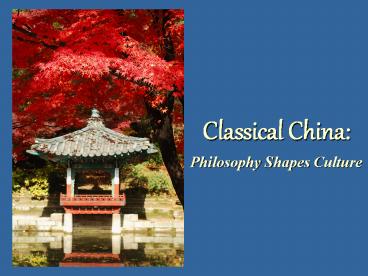Classical China: - PowerPoint PPT Presentation
1 / 12
Title:
Classical China:
Description:
Classical China: Philosophy Shapes Culture Peace Through Thinking During the Time of the Warring States, warlords and kings fight for land In response, Chinese ... – PowerPoint PPT presentation
Number of Views:131
Avg rating:3.0/5.0
Title: Classical China:
1
Classical China
- Philosophy Shapes Culture
2
Peace Through Thinking
- During the Time of the Warring States, warlords
and kings fight for land - In response, Chinese scholars develop three ways
of thinking all with the same goal to bring
peace to China - Confucianism
- Daoism
- Legalism
- Philosophy A study of basic truths ideas about
the universe
3
Confucius Seeks Peace
- Sought end to the Time of the Warring States
- Peace fundamental to all relationships
- Believed respect preceded peace, harmony
- Confucius ideas collected into a book The
Analects - Together, these teachings form the belief system
of Confucianism
Confucius Teacher, Scholar, Thinker 551 479 BCE
4
Confucius The Analects
- Knowing what he knows and knowing what he doesnt
know, are characteristics of the person who
knows. - Making a mistake and not correcting it, is making
another mistake. - The superior man blames himself the inferior man
blames others. - To go too far is as wrong as to fall short.
5
The Five Relationships
- Confucius taught code of proper conduct
- Proper conduct in family, proper conduct in
society - Ruler Subject
- Father Son
- Husband Wife
- Older Brother Younger Brother
- Older Friend Younger Friend
- Filial Piety Respect for your elders
6
Impact of Confucianism
- Confucianism set out family and social roles
- Following these roles help Chinese to avoid
conflict and live peacefully - People must respect authorityBUTrulers must
live right and respect the people - Subjects have the duty to obey ruler IF the ruler
lived in a right and moral way - Confucius encourages education, creating fair and
skilled government officials (Bureaucracy, Civil
Service)
7
Daoism (Taoism)
- Laozis ideas in Dao De Jing (The Book of the Way
of Virtue) - Daoists believe that a universal force, the Dao
(the Way), guides all things - All creatures live in harmony with the Dao EXCEPT
humans - Humans must find their own way (Dao) to relate to
nature and each other - Each person must learn to live in harmony with
nature, each other, and their inner feelings
8
Following the Way
- Daoists did not argue over good and bad, or try
to change things - Accepted things as they were did not get
involved in government - To escape the social, political, cultural
traps of life, one must - 1. Reject formal knowledge and learning
- 2. Rely on the senses and instincts
- 3. Discover the nature and rhythm of the
universe - 4. Ignore political and social laws
9
Yin Yang
- Forces of yin, yang interact, complement each
other change evolve - Yin (black) Cold, Dark, Mysterious
- Yang (white) Warm, Bright
- Understanding yin and yang help people find place
in the world
http//www.youtube.com/watch?v-gZY4i4Kg3s
10
Legalism
- Strong government would end the Time of the
Warring States - Rulers must use legal system to force people to
obey laws - Legalists believe human nature is wicked
- As a result, government must pass strict laws to
control peoples behavior - Harsh punishments for those who violate law,
would make people afraid to commit crimes
11
Legalist Principles
- Human nature is naturally selfish
- Intellectualism and literacy are discouraged
- Law is the supreme authority and replaces
morality - The ruler must rule with a strong, punishing hand
- 5. War is the means of strengthening a rulers
power
12
Think About It
- Based on what you know about the three Classical
Chinese philosophies, who would you rather have
as a teacher a Confucianist, a Daoist, or a
Legalist? Why?









![❤️[READ]✔️ Wild Swans: Three Daughters of China PowerPoint PPT Presentation](https://s3.amazonaws.com/images.powershow.com/10122556.th0.jpg?_=20240906027)



![get⚡[PDF]❤ Imperial China (DK Classic History) PowerPoint PPT Presentation](https://s3.amazonaws.com/images.powershow.com/10042750.th0.jpg?_=20240530077)
![READ [PDF] Imperial China (DK Classic History) PowerPoint PPT Presentation](https://s3.amazonaws.com/images.powershow.com/10134868.th0.jpg?_=20240921082)
















